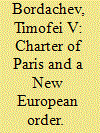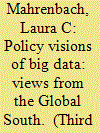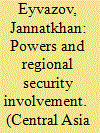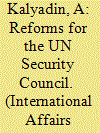| Srl | Item |
| 1 |
ID:
178801


|
|
|
|
|
| Summary/Abstract |
The end of the Cold War opened up new vistas for building a new
international order in Europe, free of dividing lines. The more so since
the liberal world order, which emerged due to the evolution of the global
order in the field of security, on the one hand, and the rules, norms, and
practices established within the community of Western countries in 1945-
1991, on the other hand, was formally the most successful combination of
the effects of such categories as the balance of power and international
institutions. At the global level, this combination for a long time made
it possible to avoid revolutionary situations that might have been
caused by utter dissatisfaction of one or several major powers with their
position. However, in Europe, where the institutional basis of international interaction was most developed, the rules of the liberal world order
brought about significant distortions in favor of one of the participants
in this interaction—the European Union, which acted as an instrument for
increasing individual capabilities of major Western European countries.
This happened because the factor of military capabilities was excluded
from the overall balance of power of the main actors. Since for a long time
after the end of the Cold War Russia was limited in all factors of power
except for the military one, its position in relations with the EU was weak,
which is why its interests and values were ignored in building an EU-led
European order. This eventually paralyzed the entire system of multilateral
interaction in Europe, which, along with the shift of the global center of
power competition towards Asia, considerably marginalized the European
space in global affairs.
|
|
|
|
|
|
|
|
|
|
|
|
|
|
|
|
| 2 |
ID:
163072


|
|
|
|
|
| Summary/Abstract |
Government intentions stand at the heart of debates about how big data can and should be used in the Global South. This paper provides new insights by examining the political and economic visions promoted by emerging power governments in Brazil, India and China (the BICs). Doing so is crucial as these countries not only comprise some of the world’s largest populations, but have also demonstrated their initiative in national and international promotion of big data politics. Drawing on a content analysis of strategic and legal documents discussing the use of big data, we identify potential areas for big data cooperation among the BICs by determining the compatibility of national policy visions. Three visions are apparent: data as a force for political liberation or repression, for improving public services and for facilitating development. Successful BIC cooperation is likely related to the latter two, but less probable for the liberation/repression vision. We conclude by identifying the implications of BIC engagement with big data for the Global South more broadly.
|
|
|
|
|
|
|
|
|
|
|
|
|
|
|
|
| 3 |
ID:
127612


|
|
|
|
|
| Publication |
2013.
|
| Summary/Abstract |
It is hardly possible to correctly and fully assess the functioning and development of a regional security system without presenting a complete account of the entire range of ties and relations among the actors involved and the degree of influence of all the powers concerned.
Based on a case study of the post-Soviet space, the author studies the involvement of powers in regional security systems; his analysis of the key parameters of this involvement makes it possible for him to identify and describe two types of involvement: full and partial.
|
|
|
|
|
|
|
|
|
|
|
|
|
|
|
|
| 4 |
ID:
147763


|
|
|
|
|
| Summary/Abstract |
FOR A LONG TIME, there have been heated debates about proposed reforms of the United Nations Security Council.* Various ways of adapting the council to 21st-century realities were suggested at the General Assembly's 70th jubilee session. The main points of controversy were whether, in the event of membership enlargement, the council should increase its number of permanent or non-permanent members and which countries should be included in the permanent group if the latter bacame larger. Unfortunately, these debates don't seem likely to be over any time soon.
|
|
|
|
|
|
|
|
|
|
|
|
|
|
|
|